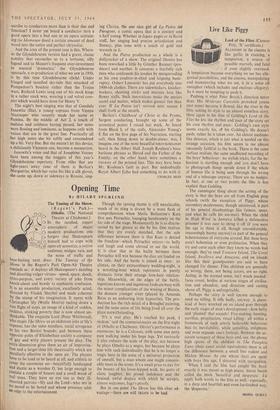Live Like Piggy
°' ALLEGORY in the cinema is
like garlic in cooking, a temptation, a source of '''',..„_...,•,, possible marvels, and fatal - - --_-% / if even slightly overused.
A temptation because everything we see has alle- gorical possibilities, and the cinema, manipulating and manoeuvring what we see, is in a sense all metaphor (which includes and encloses allegory). So it must be tempting to push it.
Pushing is what Peter Brook's direction never does. His Moderato Cantabile provoked yawns (not mine) because it flowed, like the river in the film, suiting its style to an almost eventless story. Here again in his film of Golding's Lord of the Flies he lets the rhythm and pace of the story set his own rhythm and pace: Golding's own style seems exactly his, of his Golding's. He doesn't push; rather he is taken over. An almost medium- like director, which is just what is needed on this strange occasion, his film seems to me almost uncannily faithful to the book. There is the same surface realism, the same unaffected recording of the boys' behaviour: no stylish tricks, for the be- haviour is startling enough and you don't have to photograph things upside down if the whole of human life is being seen through the wrong end of a telescope anyway. There are no nudges. In fact, at one or two points the film is less explicit than Golding.
The cunningest thing about the setting of the
story is that the boys are all from English prep schools (with the exception of Piggy, whose secondary-modernness, though unstressed, is part of his general disadvantage like fatness, specs, and what he calls his ass-mar). When the child in High Wind in Jamaica killed a defenceless prisoner it was easy to shrug it off (if you were the age to think it all, though uncomfortable, reassuringly barmy anyway) as part of the general bohemianness of everyone around. But these boys aren't bohemian or even proletarian. When they try and curse each other they know no words bad enough; they've read Treasure Island, The Coral Island, Swallows and Amazons, and on islands like this their grandparents are said to have changed for dinner. Film children are generally so wrong; these, not being actors, are so right. Acting, in the normal sense, isn't much needed: faces count, bodies at various stages of civilisa- tion and abandon; and direction and casting above all. Piggy is unforgettable.
Perhaps the story is well known enough to
need no telling. It tells badly, anyway. A plane- load of boys wrecked on an island goes through the early stages of man's development—how hefty and 'planted' that sounds! Fire-making, hunting, sacrifice, propitiation, ritual killing: all within a framework of such utterly believable behaviour that its inevitability, while appalling, enlightens and even expands one's feelings. Between the ac- curate savagery of these boys and, say, the phony high spirits of the children in The Pumpkin Eater (their exact social equivalents) there is all the difference between a small live rodent and Mickey Mouse. As one whose days are spent with boys this age, I shivered with recognition.
When I said the film had caught the book
exactly it was meant as high praise. Stevie Smith called the book 'beautiful and desperate.' I'd apply both words to the film as well—especially, in a deep and heartfelt and even far-fetched way, the 'desperate.'
ISABEL QUIGLY






























 Previous page
Previous page